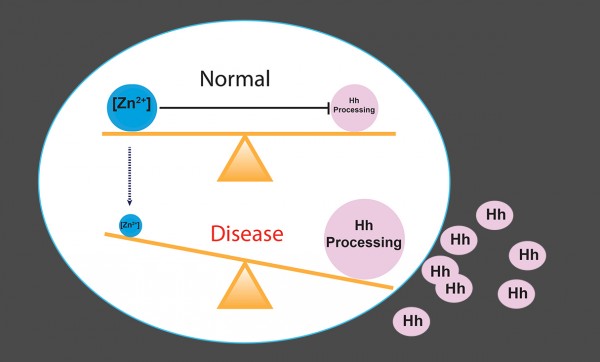Zinc Deficiency Linked to Activation of Hedgehog Signaling Pathway

RPI Novel mechanism in diseases: zinc deficiency can enhance Hedgehog (Hh) ligand production and activate Hh signal pathway
Zinc deficiency – long associated with numerous diseases, e.g. autism, lung cancer, prostate cancer, and ovarian cancers – can lead to activation of the Hedgehog signaling pathway, a biomolecular pathway that plays essential roles in developing organisms and in diseases, according to new research at Rensselaer Polytechnic Institute.
“Hedgehog is critical to normal development, but in adults the pathway, if reactivated, may lead to uncontrolled cell growth and proliferation in cancer,” said Chunyu Wang, associate professor in biological sciences at Rensselaer, member of the Center for Biotechnology and Interdisciplinary Studies, and corresponding author of the research. “Our paper suggests a link between zinc deficiency and activation of the Hedgehog pathway in many diseases where zinc deficiency and Hedgehog activation co-exist.”
The paper, titled “Zinc Inhibits Hedgehog Autoprocessing,” was recently published online in the Journal of Biological Chemistry, demonstrating that zinc inhibits the activation of the Hedgehog signaling pathway by binding to a section of a precursor protein that activates the pathway.
The Hedgehog pathway is a key regulator of cell growth and development that helps to establish the body plan of all animals with bilateral symmetry. In a critical step that launches Hedgehog signaling, the Hedgehog precursor protein divides itself or “self-cleaves” into two parts: the Hedgehog ligand responsible for signaling, and a catalytic domain responsible for the self-cleavage. No external catalyst is needed in the autoprocessing reaction, with the Hedgehog catalytic domain acting as the catalyst in the transformation.
Researchers demonstrated that zinc, when present, binds to the active sites of the catalytic domain and inhibits the autoprocessing and therefore, the generation of the Hedgehog ligand. Zinc deficiency is correlated with autism and many cancers; for example, a hallmark of prostate cancer is zinc deficiency in prostate tissue. However, the exact relationship between a lack of zinc and the development of disease is not fully understood.
“Normally, in adults, zinc will inhibit the production of the Hedgehog ligand, and therefore inhibit the Hedgehog pathway,” said Wang. “But if there is a zinc deficiency, the pathway can be activated due to enhanced production of Hedgehog ligand. We show that zinc inhibits this autoprocessing reaction from the precursor to the ligand, providing an additional mechanism of how zinc deficiency may promote cancer development. This is something that nobody else has shown before. Zinc and Hedgehog are essential and extremely versatile biomolecules; linking these two will have profound implications for normal physiology and disease.”
The research included testing in vitro and in cell culture using astrocytes (star-shaped cells found in the brain). Using solution NMR, researchers also examined zinc interaction with the Hedgehog catalytic domain, to determine the binding site of zinc — the specific amino acids within the protein to which the zinc binds.
A team of researchers participated in this research, including first author Jian Xie, a fourth-year graduate student in the biochemistry and biophysics graduate program at Rensselaer; the research group of Brian Callahan, assistant professor of chemistry at Binghamton University, at the State University of New York; the group of Leo Wan, assistant professor in the Department of Biomedical Engineering at Rensselaer; and Brigitte Arduini, director of Rensselaer Center for Stem Cell Research in the Center of Biotechnology and Interdisciplinary Studies, among many others.
Contact Information
Mary Martialay
Sr. Communications Specialist
martim12@rpi.edu
Phone: 518-276-2146
Mobile: 518-951-5650
Media Contact
More Information:
http://www.rpi.eduAll latest news from the category: Health and Medicine
This subject area encompasses research and studies in the field of human medicine.
Among the wide-ranging list of topics covered here are anesthesiology, anatomy, surgery, human genetics, hygiene and environmental medicine, internal medicine, neurology, pharmacology, physiology, urology and dental medicine.
Newest articles

Sea slugs inspire highly stretchable biomedical sensor
USC Viterbi School of Engineering researcher Hangbo Zhao presents findings on highly stretchable and customizable microneedles for application in fields including neuroscience, tissue engineering, and wearable bioelectronics. The revolution in…

Twisting and binding matter waves with photons in a cavity
Precisely measuring the energy states of individual atoms has been a historical challenge for physicists due to atomic recoil. When an atom interacts with a photon, the atom “recoils” in…

Nanotubes, nanoparticles, and antibodies detect tiny amounts of fentanyl
New sensor is six orders of magnitude more sensitive than the next best thing. A research team at Pitt led by Alexander Star, a chemistry professor in the Kenneth P. Dietrich…





















